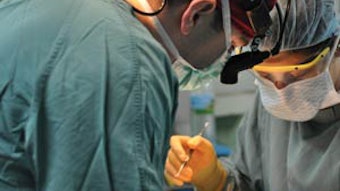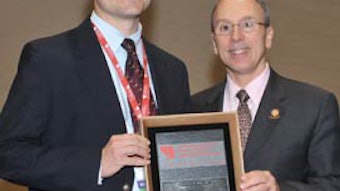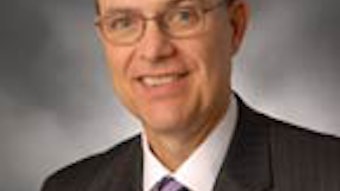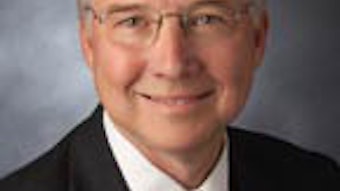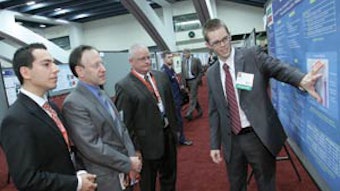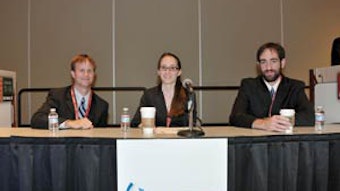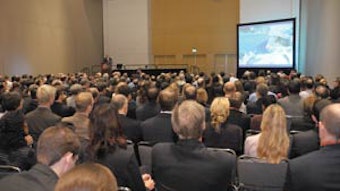2011 State Legislative Wrap-Up
In 2011, the AAO-HNS reviewed thousands of bills introduced across the country to determine relevancy to the specialty. Of those bills, the Academy has been actively tracking more than 620 state bills, including many held over from the 2010 session, and has identified approximately 40 key bills in 29 states. The Academy has been providing strategy, advocacy resources, and coalition engagement to state otolaryngology societies, as needed. Members can view a full listing of these bills through the State Advocacy website (www.entnet.org/Practice/members/stateAdvocacy.cfm), which provides real-time access to active state legislation and relevant information. The following is a brief summary of some of the Academy’s 2011 priority state bills and other highlights from the year. Scope of Practice The AAO-HNS believes it is appropriate for non-physician providers to seek updates to statutes and regulations relating to their defined scope of practice to reflect advances in education and training. However, the AAO-HNS strongly opposes state legislation that would inappropriately expand the scope of practice of non-physician providers beyond their education and training. Enabling non-physician providers to independently diagnose, treat, or manage medical disorders could adversely affect the quality of patient care. This year, the AAO-HNS has advocated to modify and/or defeat several potentially harmful bills that would have inappropriately expanded the scope of practice of non-physician professionals. In South Dakota, the AAO-HNS successfully opposed a bill regulating the practice of speech-language pathology. The bill, as proposed, would have inappropriately expanded the scope of practice of speech-language pathologists, allowing them to diagnose, manage, and treat speech disorders. The bill passed the House, but was tabled in a Senate committee. Similarly, the West Virginia legislature considered a scope-of-practice expansion bill for speech-language pathologists and audiologists. The AAO-HNS worked closely with the state medical association to highlight concerns as the bill moved through the legislative process. The bill passed the House, but the Senate committee declined to move it forward prior to the end of the legislative session. Companion bills in New York sought to permit non-physician oral and maxillofacial surgeons to perform elective surgeries in the oral and maxillofacial regions if granted hospital privileges. The AAO-HNS worked with other physician groups to defeat these bills and submitted letters to both the Senate and Assembly opposing the proposal. The legislation passed the Senate, but did not progress further in 2011. The bills will continue to be a concern as New York bills being considered in 2011 will be carried over to the 2012 session. The Massachusetts legislature is considering a bill that encourages the practice of primary care services by nurse practitioners and physician assistants. The AAO-HNS and the Massachusetts Society of Otolaryngology (MSO) sent a joint letter to members of the Massachusetts legislature urging their opposition to the bill. The bill remains in committee and the Academy will continue to monitor this concerning proposal. Taxes on Medical Procedures Each year, there is a re-emergence of proposals to tax medical procedures, and in light of extensive state budget shortfalls, this year has been no exception. The Stop Medical Taxes Coalition, of which the AAO-HNS is a member, asserts that the taxation of medical procedures is unfair for patients and is a “slippery slope” toward the taxation of other medical services. In Connecticut, a 6.35-percent cosmetic medical procedures tax was included in the Governor’s final budget. The AAO-HNS and other coalition members submitted written testimony to the Connecticut legislature and a letter to the Governor in opposition to the tax. The AAO-HNS will continue to work closely with the coalition to oppose the implementation of this new tax. The Washington House proposed a sales and use tax on cosmetic procedures to fund the maintenance of basic health program enrollment. The bill failed to clear the House by the “cross-over” date, so the legislation died in the 2011 session. New Jersey reintroduced a bill to repeal the 6-percent tax currently imposed on cosmetic procedures. Under the proposal, the tax would be reduced by 2 percent each year, for 3 years, ending with a 0 percent tax rate. The AAO-HNS submitted written testimony to the New Jersey legislature in support of repealing the tax. The bill has passed the Senate, and is waiting to be heard in the house. Hearing Aid Services The coverage, sale, and dispensing of hearing aids is an issue considered by several states in various forms each year, and 2011 was no different. In New York, the AAO-HNS worked with the Patient Access to Hearing Aids (PAHA) Coalition to pass a bill that would expand patients’ access to hearing aid services by striking an archaic law prohibiting physicians from deriving a profit on hearing aid sales. This year, the PAHA Coalition attained introduction of both a Senate and an Assembly bill. The AAO-HNS and PAHA will continue to advocate on these bills as they will be carried over to the 2012 session. Several states considered bills to require insurers to cover the cost of or expand benefits for hearing aids and/or cochlear implants, including California, Hawaii, Illinois, Kansas, Maryland, Massachusetts, Minnesota, New Hampshire, New York, Tennessee, and Vermont. Several states also considered bills that would provide a tax credit and/or exemption for hearing aids, including Arizona, Arkansas, Florida, Michigan, and Oklahoma. Truth in Advertising With the emergence of clinical doctoral programs for non-physician providers and many degree holders referring to themselves as “doctors,” there has been growing confusion within the patient population about the level of training and education of their healthcare providers. In 2011, there were 13 truth-in-advertising bills introduced in the states, a few of which are highlighted below. In Colorado, there was a proposed bill that failed to progress beyond committee. The bill would have required practitioners to wear photo ID badges that stated their type of license. Practitioners would have also been responsible for communicating to their patients if care was being provided by someone other than a medical doctor or doctor of osteopathic medicine. Connecticut became the most recent state to pass truth-in-advertising legislation in 2011. The bill requires healthcare providers to wear a photo identification badge during work hours that displays the facility name, provider name, type of license, and title/position with the facility. The Massachusetts legislature considered a bill that would add the term “oral physician” for dentists’ scope of practice and for compliance with the state’s current truth-in-advertising language. The Academy submitted joint testimony in opposition to the proposed bill. At this time the bill remains in committee. Tobacco Use and Smoking Cessation The AAO-HNS supports legislation and regulations that will help to reduce the use of tobacco products and exposure to secondhand smoke in order to promote healthy environments and lifestyles for the public. This year, bills were introduced in 14 states that sought to strengthen existing smoking ban laws, including Alabama, California, Connecticut, Indiana, Iowa, Maryland, Massachusetts, Michigan, Mississippi, New Jersey, Oklahoma, South Carolina, West Virginia, and Wyoming. A number of states considered proposals to mandate insurance coverage and/or benefits for tobacco cessation, including California, Connecticut, Hawaii, Massachusetts, Mississippi, New York, and Washington. Two states, Hawaii and Illinois, proposed legislation to exempt certain establishments from a smoking ban if they were to become “licensed” as exempt—a potential revenue source for the state. Medical Liability Reform In 2011, 22 states considered various tort reform measures, including those related to affidavits of merit, alternative reforms, caps on non-economic damages, defensive medicine issues, expert witnesses, health courts, or pre-trial screening panels. Oklahoma and Tennessee successfully enacted caps on non-economic damages in civil actions; Pennsylvania passed new joint and several liability reforms; and Michigan enacted an apology inadmissibility bill. Looking ahead to 2012, the AAO-HNS will continue to track and advocate on these important issues and others as they arise. Many of these issues will continue through 2012 and beyond, as states look to adjust to the ever-changing healthcare environment. The AAO-HNS will continue to actively engage with specialty societies and the state medical societies on these important issues to strengthen our voice in the state legislatures. For more information on state legislative issues or specific measures, contact AAO-HNS State Legislative Affairs at legstate@entnet.org or 1-703-535-3794.
Scope of Practice
The AAO-HNS believes it is appropriate for non-physician providers to seek updates to statutes and regulations relating to their defined scope of practice to reflect advances in education and training.
However, the AAO-HNS strongly opposes state legislation that would inappropriately expand the scope of practice of non-physician providers beyond their education and training. Enabling non-physician providers to independently diagnose, treat, or manage medical disorders could adversely affect the quality of patient care. This year, the AAO-HNS has advocated to modify and/or defeat several potentially harmful bills that would have inappropriately expanded the scope of practice of non-physician professionals.
- In South Dakota, the AAO-HNS successfully opposed a bill regulating the practice of speech-language pathology. The bill, as proposed, would have inappropriately expanded the scope of practice of speech-language pathologists, allowing them to diagnose, manage, and treat speech disorders. The bill passed the House, but was tabled in a Senate committee.
- Similarly, the West Virginia legislature considered a scope-of-practice expansion bill for speech-language pathologists and audiologists. The AAO-HNS worked closely with the state medical association to highlight concerns as the bill moved through the legislative process. The bill passed the House, but the Senate committee declined to move it forward prior to the end of the legislative session.
- Companion bills in New York sought to permit non-physician oral and maxillofacial surgeons to perform elective surgeries in the oral and maxillofacial regions if granted hospital privileges. The AAO-HNS worked with other physician groups to defeat these bills and submitted letters to both the Senate and Assembly opposing the proposal. The legislation passed the Senate, but did not progress further in 2011. The bills will continue to be a concern as New York bills being considered in 2011 will be carried over to the 2012 session.
- The Massachusetts legislature is considering a bill that encourages the practice of primary care services by nurse practitioners and physician assistants. The AAO-HNS and the Massachusetts Society of Otolaryngology (MSO) sent a joint letter to members of the Massachusetts legislature urging their opposition to the bill. The bill remains in committee and the Academy will continue to monitor this concerning proposal.
Taxes on Medical Procedures
Each year, there is a re-emergence of proposals to tax medical procedures, and in light of extensive state budget shortfalls, this year has been no exception. The Stop Medical Taxes Coalition, of which the AAO-HNS is a member, asserts that the taxation of medical procedures is unfair for patients and is a “slippery slope” toward the taxation of other medical services.
- In Connecticut, a 6.35-percent cosmetic medical procedures tax was included in the Governor’s final budget. The AAO-HNS and other coalition members submitted written testimony to the Connecticut legislature and a letter to the Governor in opposition to the tax. The AAO-HNS will continue to work closely with the coalition to oppose the implementation of this new tax.
- The Washington House proposed a sales and use tax on cosmetic procedures to fund the maintenance of basic health program enrollment. The bill failed to clear the House by the “cross-over” date, so the legislation died in the 2011 session.
- New Jersey reintroduced a bill to repeal the 6-percent tax currently imposed on cosmetic procedures. Under the proposal, the tax would be reduced by 2 percent each year, for 3 years, ending with a 0 percent tax rate. The AAO-HNS submitted written testimony to the New Jersey legislature in support of repealing the tax. The bill has passed the Senate, and is waiting to be heard in the house.
Hearing Aid Services
The coverage, sale, and dispensing of hearing aids is an issue considered by several states in various forms each year, and 2011 was no different.
- In New York, the AAO-HNS worked with the Patient Access to Hearing Aids (PAHA) Coalition to pass a bill that would expand patients’ access to hearing aid services by striking an archaic law prohibiting physicians from deriving a profit on hearing aid sales. This year, the PAHA Coalition attained introduction of both a Senate and an Assembly bill. The AAO-HNS and PAHA will continue to advocate on these bills as they will be carried over to the 2012 session.
- Several states considered bills to require insurers to cover the cost of or expand benefits for hearing aids and/or cochlear implants, including California, Hawaii, Illinois, Kansas, Maryland, Massachusetts, Minnesota, New Hampshire, New York, Tennessee, and Vermont. Several states also considered bills that would provide a tax credit and/or exemption for hearing aids, including Arizona, Arkansas, Florida, Michigan, and Oklahoma.
Truth in Advertising
With the emergence of clinical doctoral programs for non-physician providers and many degree holders referring to themselves as “doctors,” there has been growing confusion within the patient population about the level of training and education of their healthcare providers. In 2011, there were 13 truth-in-advertising bills introduced in the states, a few of which are highlighted below.
- In Colorado, there was a proposed bill that failed to progress beyond committee. The bill would have required practitioners to wear photo ID badges that stated their type of license. Practitioners would have also been responsible for communicating to their patients if care was being provided by someone other than a medical doctor or doctor of osteopathic medicine.
- Connecticut became the most recent state to pass truth-in-advertising legislation in 2011. The bill requires healthcare providers to wear a photo identification badge during work hours that displays the facility name, provider name, type of license, and title/position with the facility.
- The Massachusetts legislature considered a bill that would add the term “oral physician” for dentists’ scope of practice and for compliance with the state’s current truth-in-advertising language. The Academy submitted joint testimony in opposition to the proposed bill. At this time the bill remains in committee.
Tobacco Use and Smoking Cessation
The AAO-HNS supports legislation and regulations that will help to reduce the use of tobacco products and exposure to secondhand smoke in order to promote healthy environments and lifestyles for the public. This year, bills were introduced in 14 states that sought to strengthen existing smoking ban laws, including Alabama, California, Connecticut, Indiana, Iowa, Maryland, Massachusetts, Michigan, Mississippi, New Jersey, Oklahoma, South Carolina, West Virginia, and Wyoming.
A number of states considered proposals to mandate insurance coverage and/or benefits for tobacco cessation, including California, Connecticut, Hawaii, Massachusetts, Mississippi, New York, and Washington. Two states, Hawaii and Illinois, proposed legislation to exempt certain establishments from a smoking ban if they were to become “licensed” as exempt—a potential revenue source for the state.
Medical Liability Reform
In 2011, 22 states considered various tort reform measures, including those related to affidavits of merit, alternative reforms, caps on non-economic damages, defensive medicine issues, expert witnesses, health courts, or pre-trial screening panels. Oklahoma and Tennessee successfully enacted caps on non-economic damages in civil actions; Pennsylvania passed new joint and several liability reforms; and Michigan enacted an apology inadmissibility bill.
Looking ahead to 2012, the AAO-HNS will continue to track and advocate on these important issues and others as they arise.
Many of these issues will continue through 2012 and beyond, as states look to adjust to the ever-changing healthcare environment. The AAO-HNS will continue to actively engage with specialty societies and the state medical societies on these important issues to strengthen our voice in the state legislatures.
For more information on state legislative issues or specific measures, contact AAO-HNS State Legislative Affairs at legstate@entnet.org or 1-703-535-3794.
